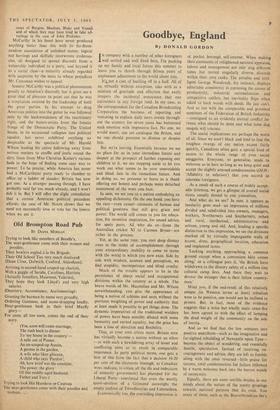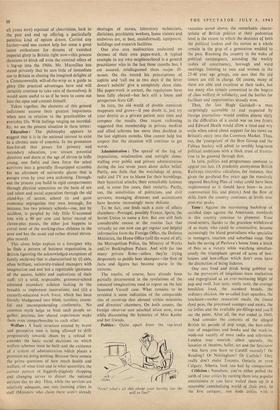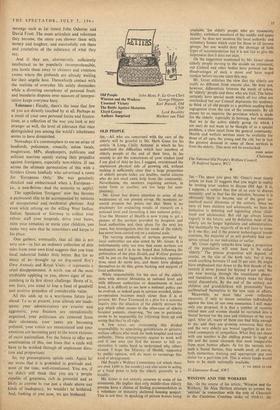Goodbye, England
By DONALD GORDON
I N company with a number of.other foreigners well settled and well fixed here, I'm packing up my family and local future this summer to leave you to thresh through fifteen years of unpleasant adjustment to the world about you.
It'‘not a case of bustling off in a huff. All of us, virtually without exception, take with us a mixture of gratitude and affection that easily tempers the incidental annoyance that one encounters in any fOreign land. In my case, as the correspondent for the Canadian Broadcasting Corporation the business of reporting and venturing to explain daily news events through- out the country for seven years has buttressed such emotion with impressive fact. No one, we would assert, can yet catalogue the Briton, and no one should presume to dismiss or despise him.
But we're leaving. Essentially because we see no place for us in your immediate future and despair at the prospect of further exposing our children to it, we are stepping aside to let you work out what seems to be your unavoidable and bleak fate in the immediate future. And in doing so, we presume to leave as a thank offering our honest and perhaps more detached assessment of the woes you face.
In sum, we see you as a nation embodying an appalling dichotomy. On the one hand, you have the easy—even casual—elements of human and political greatness that still give grace and power. The world still comes to you for educa- tion, for inventive inspiration, for sound advice, for spare parts. All who do so—from the Australian cricket XI to Carmen Bryan—are richer in the process.
Yet, at the same time, you root deep dismay even in the midst of accomplishment through your extraordinary inability to come to terms with the world in which you now exist, Side by side with wisdom, acumen and perception, we find stupidity, incompetence and blind cruelty.
Much of the trouble appears to lie in the persistence of sharp social and occupational divisions within the country as a whole. The brave words of Mr. Macmillan and Mr. Wilson notwithstanding, you give the appearance of being a nation of schisms and sects without the previous weighting of power and authority that at least made it possible to get things done. The dynamic imperatives of the traditional wielders of power have been sensibly diluted with some humanity and earned equality, but the price has been a loss of direction and flexibility.
Thus, as your own critics insist, Britain now has virtually become a nation without an ethos —or with such a bewildering array of lesser and conflicting aims as to result in comparable impotence. In party political terms, one gets a hint of this from the fact that a decisive 16-20 per cent of the electorate (enough, as Canadian woes indicate, to create all the ills and indecision of minority government) has plumped for the Liberal Party—convinced that even the woolly quasi-idealism of a Cirlmond outweighs the empty realism of Tweedletories and Labourdees.
Economically too, the overriding impression is of pocket borough self-interest. When making their statements of enlightened national appraisal, labour and management not only sing different tunes but record singularly diverse discords within their own ranks. The amiable and intel- ligent George Woodcock, for instance, displays admirable consistency in espousing the causes of productivity, industrial rationalisation and competitive calibre, but inevitably flops when asked to back words with deeds. He just can't. And so too with the comparable and groomed nominees of the Federation of British Industries —consigned to an evidently eternal Conflict be- tween what should be done and what lame dog moguls will tolerate.
The social implications are perhaps the worst of all. Since we aren't black and tend to lose the roughest twangs of our native accent fairly quickly, Canadians often gain a special kind of access to the whole range of your social snuggeries. Everyone, to generalise, tends to welcome us in here so long as we keep quiet and accept the slightly amused condescension (OED: 'Affability to inferiors') that you accord to tolerable foreigners.
As a result of such a course of widely accept- able listening, we get a glimpse of overall social strata usually denied to you yourselves.
And what do we see? In sum, it appears as insularity gone mad—an impression of millions divided and subdivided into owners, managers, workers, Northerners and Southerners, urban and rural, intellectual, administrative and artisan, young and old. And, lending a specific distinction to this impression, we see the divisions marked off by virtually impregnable walls of accent, dress, geographical location, education and implanted tastes.
'Lacking anything approaching a common ground except when a convenient blitz comes along,' as a colleague puts it, 'the British have withdrawn to the illusory safety of a million tiny cultural camp fires. And there they wait to devour the stranger that is their fellow country- man.'
Mind you, if the end-result of this relatively unique (in Western terms at least) tribalism were to be positive, one would not be inclined to protest. But, in fact, most of the evidence suggests that a tense but wholly static cease-fire has been agreed to with the effect of lumping the dead weight of the community on the side of inertia.
And so we find that the few ventures into positive anarchism—such as the imaginative and far-sighted rebuilding of Newcastle upon Tyne— become the object of wondering, and essentially hostile, speculation. Instead of receiving en- couragement and advice, they are left to fumble along with the onus reversed—little praise for success, total condemnation for failure followed by a warm welcome back into the barren womb of anonymity.
Equally, there are some terrible doubts in our minds about the nature of the scanty gropings towards national purpose that do exist. Too many of them, such as the Beaverbrookian (he's all yours now) espousal of chauvinism, look to the past and end up offering a particularly pointless kind of opium dream. Carried any further—and one cannot help but sense a great latent enthusiasm for dreams of vanished imperial glory in Britain right now—this process threatens to block off even the external offers of leg-up into the 1960s. Mr. Macmillan has stated privately that he sees little of immediate use to Britain in chasing the imagined delights of a Commonwealth will-of-the-wisp as a guide to glory (the practical advantages have and will certainly continue to take care of themselves). It would seem useful to us if he were to come out into the open and commit himself.
Taken together, the elements of this general indictment assume their greatest importance when seen in relation to the practicalities of everyday life. With feelings verging on incredul- ity, we see the present situation in these terms: Education : The philosophy appears to suggest that it is in the national interest to exist in a chronic state of anaemia. In the premature free-for-all that passes for primary and secondary education, you stream potential directors and doers at the age of eleven (a trifle young, one feels) and then force the select survivors into a generally ill-equipped scramble for an allotment of university places that is meagre even by your own reckoning. Through- out the process you build in rigid compartments through physical separation on the basis of sex and talent and social separation through the old stand-bys of accent, school tie and quiet economic segregation (my own borough, for instance, has two primary schools—one, just by accident, is peopled by tidy little U-accented tots with a 90 per cent and better record of eleven-plus passes, the other just happens to corral most of the working-class children in the area and has the usual and rather dismal eleven- plus record).
' This alone helps explain to a foreigner why he finds a pattern of business organisation in Britain (ignoring the acknowledged exceptions of family enclaves) that is characterised by (0 able, often brilliant, university-trained managers with imagination and zest but a regrettable ignorance of the nature, habits and aspirations of their staff; (ii) a solid, respectable, grammar-school educated secondary echelon lacking in the breadth to implement innovations; and (iii) a cursorily-educated work force, which has been literally bludgeoned into blind, tasteless, resent- ful and uncomprehending conformity. No common myth helps to bind such people to- gether, precious few shared experiences make them even comprehensible to each other.
Welfare : A basic structure created by brave and perceptive men is being allowed to drift progressively towards chaos by a refusal to consider the basic social decisions on which welfare schemes must be built and the existence of a system of administration which places a premium on doing nothing. Because there remain the prime questions of how much health and welfare, of what kind and in what quantities, the current pattern of higgledy-piggledy chopping and changing serves to distort the national services day by day. Thus, while the services are relatively adequate, one sees looming crises in staff (Ministers who claim there aren't already shortages of nurses, laboratory technicians, dieticians, psychiatric workers, home visitors and midwives are, at best, misinformed), equipment, buildings and research facilities.
One also sees mediocrities enshrined on thrones of their own paper-work. A typical example in my own neighbourhood is a general practitioner who in the last three months has, 1 am. assured, misdiagnosed three major ill- nesses. On the • record his prescriptions of aspirin and 'call me in two days if the fever doesn't subside' give a completely clean slate. His paper-work is correct, the regulations have been fully obeyed—but he's still a lousy and prosperous State GP.
In turn, the old world of double standards reappears and grows—if you doubt it, just try your dentist as a private patient next time and compare the results. One recent reckoning suggested that membership in private medical and allied schemes has more than doubled in the last eighteen months. One cannot help but suspect that the situation will continue to get worse.
Administration : The spread of the fog of imprecision, misdirection and outright stone- walling over public and private administration during the last seven years alone defies belief. Partly, one feels that the watchdogs of press, radio 'and TV are to blame for their bumblings, their hysterical attacks, their remarkable laziness and, in some few cases, their veniality. Partly, too, the sensitivities of politicians and civil servants, managing directors and accountants have become increasingly more delicate.
To be fair, one finds such a state of affairs elsewhere—Portugal, possibly France, Spain, the Soviet Union to name a few. But one still feels considerable unease at the routine fact that virtually no one now can get regular and helpful information from the Foreign Office, the Defence Ministries, the Home Office (still the worst of all), the Metropolitan Police, the Ministry of Works and/or Buckingham Palace. And with. far too many private firms—unless they're trying desperately to peddle beer shampoo—the flow of facts and figures has become sparse in •the extreme.
The results, of course, have already been partially documented in the revelations of the coloured imaginations used to report on the late lamented Vassall case. What remains to be revealed is some indication of the comparable sins of cover-up that abound within ministries and directors' chambers. On both counts, the foreign observer sees mischief afoot now, even while discounting the hysterics of Miss Keeler and her friends.
Politics : Quite apart from the top-level ',N.low! what's all this about your having lost the will to live?' vacuities noted above, the remarkable charac- teristic of British politics at their pedestrian level is the extent to which the destinies of both the political leaders and the nation as a whole remain in the grip of a generation wedded to the past. Roaming the country in the wake of political campaigners, attending the weekly rashes of 'constituency, borough and ward meetings, listening to men and women in the 25-40 year age groups, one sees that the old timers are still in charge. Of course, many of them are able and excellent at their tasks, but too many also remain committed to the bogeys of class' welfare or solidarity, and the battles for facilities and opportunities already won: Thus, the late Hugh Gaitskell—a man surprisingly accessible to and respected by foreign journalists—would confess almost shyly to the difficulties of a social war on two fronts and Edward Heath would allow a tired and wry smile when asked about support for his views on Britain's entry into the Common Market. Thus, too, the 'youngsters' of the Bow Group and the Fabian Society will admit to terribly long-term political ambitions with a:thick crust of frustra- tion to be gnawed through first.
In turn, politics and programmes continue to appear too late. (A prudently anonymous British Railways executive calculates, for instance, that given the go-ahead five years ago the massively opposed Beeching Plan of today could have been implemented as it should have been—in non- controversial bits and pieces.) And the flow of skills from the country continues at levels near post-war peaks.
Taste : Against the murmuring backdrop of satisfied slaps against the Americans, standards in this country continue to plummet. Your trend-setters, thanks to the graceless withdrawal of so many who could be constructive, become increasingly the bland generalisers who specialise in teenagers, tourism and suburban soap. One bails the saving of Pavlova's house from a block of flats as a victory while watching simultan- eously, the triumphant spread of acres of box- houses and box-offices which don't even have the distinction of being hideous.
One sees food and drink being gobbled up by the purveyors of iniquitous mass marketism and regurgitated as an ever-increasing blight of pap and swill. Just taste, really taste, the average breakfast food, the standard breads, the ordinary chicken, the so-called fruit squashes, the luncheon-voucher restaurant meals, the tinned ,dyed peas, the processed sausages and meats, the ice. lollies and the available pie-fillings and you'll see the point. After all, the war ended in 1945.
And consider the contents of the alleged British hit .parade of pop songs, the best-seller lists of magazines and books and the week-in, week-out vacuity of most radio and television. London may nourish,. albeit sparsely, the luxuries of theatres, ballet, art and the Spetatot. —but have you been to Cardiff recently? Or Reading? Or Nottingham? Or Carlisle? They really don't make 'Toronto, Ontario or even Calgary, Alberta, look too bad by comparison.
Criticism : Somehow, you've either pulled the teeth of your critics by turning them into popular entertainers or you have walled them up in a miserable, cannibalising world of their own. In the first category, one finds critics with a message such as (at times) John Osborne and David Frost. The more articulate and vehement they, become, the more you shower them with money and laughter, and successfully rob them and yourselves of the substance of what they say.
And if they are, alternatively, sufficiently intellectual to be popularly incomprehensible, you hustle them away to cloisters and common rooms where the pinheads are already waiting for their angelic host. Thenceforth contact with the realities of everyday life safely diminishes while a diverting cacophony of personal feuds and mandarin disputes over nuances of interpre- tation keeps everyone busy.
Tolerance : Finally, there's the issue that few of you are directly touched by at all. Perhaps as a result of your own personal furies and frustra- tions, as a reflection of the way you look at any stranger as well, the level of tolerance that once distinguished you among the world's inhabitants seems to have diminished.
Nowadays it's commonplace to see an array of landlords, policemen, councils, union locals, magistrates, MPs, shopkeepers, publicans and militant matrons openly stating their prejudice against foreigners, especially non-whites. (I ran across the ultimate permutation of this with a Golders Green landlady who advertised a room for 'Europeans Only.' She was genuinely shocked and embarrassed when a European- i.e., a non-Briton—had the temerity to apply).
The appellation 'foreigner' now has become a permanent title to be accompanied by versions of occupational and. residential ghettoes. And even while relying on the willing West Indian, Italian, Spaniard or German to collect your refuse, staff your hospitals, drive your buses, raise your tomatoes or nurse your children, you make very sure that he remembers and keeps to his place.
One gathers, eventually, that all this is not very new—in fact an ordinary collection of dole tales from your own kind suggests that you treat local industrial fodder little better. But for so many of us—brought up on dog-eared Boy's Own Annuals and Royal Visits—it represents a cruel disappointment. A myth, one of the most creditable applying to you, shows signs of suc- cumbing to its first direct challenge. Shorn of it, one fears, you stand to lose a fund of goodwill and positive prejudice of considerable value.
All this adds up to a worrisome future just ahead. To us at present, your sChools are inade- quate, your administrators are evasive and aggressive, your finances are unrealistically organised, your politicians are removed from their electorate, your tastes are becoming polluted, your critics arc emasculated and your emotions are becoming prey to the worst excesses of racist nationalism. For the future to offer any amelioration of this, one fears that a cycle will have to be worked through of unpleasant dura- tion and proportions.
So, my presumptuous epistle ends. Again let me stress that it is grounded in gratitude and, most of the time, well-intentioned. You sec, if we didn't still think that you are a people capable of greatness, rich in potential and as likely as anyone to rise just a shade above our kinds of inadequacy, we wouldn't be bothered. And, looking at you now, we are bothered.








































 Previous page
Previous page